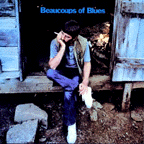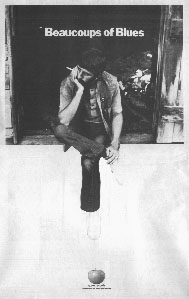![]()
  |

Beaucoups Of Blues
Ringo Starr
Apple 3368
Released: September 1970
Chart Peak: #65
Weeks Charted: 15

 Correct me if I'm wrong, but I would venture the guess that not too many people reading these words could say that they look to Ringo Starr for New Horizons in Pop Music.
Correct me if I'm wrong, but I would venture the guess that not too many people reading these words could say that they look to Ringo Starr for New Horizons in Pop Music.
Still with me? Then, I am prepared to say that you won't be disappointed with Ringo's all-country and western album, Beaucoups of Blues. Shucks, you'll probably even like it.
Anyone who can recall Ringo's rollicking renditions of Carl Perkins' "Matchbox" or Buck Owens' "Act Naturally," or even Ringo's own "Don't Pass Me By" from the eldest white album, will know of the Beatle's affection for country and western, and I don't think I'm alone in knowing that I'll never be able to hear Lorne Greene sing his oldie-but-goodie, "Ringo," without picturing Richard Starkey, cute and majestic atop his pony, the high noon sun bathing down on his neck, sending rays glinting off his sheriff's badge and his rings.
So Ringo has always had a vaguely country and western image anyway, so why not put out his first solo record (let's be generous and forget Sentimental Journey) in the country and western genre? That sounds like a good idea. So Ringo went all the way to Nashville to record what sounds like Marion Lorne attempting to sing the Tammy Wynette songbook.
Beaucoups of Blues is an unusually apt title for this collection of 12 songs, each one sounding more ridiculously degenerate than the one before. And the very thought of Ringo Starr being backed by the cream of Nashville's studio musicians from Jerry Reed right on down to the Jordanaires, produced by Pete Drake, the man who made the steel guitar fucking talk, and engineered by Elvis' old guitar player, Scotty Moore, is, well... Ringo doesn't even play drums on the record, and I thought he played drums.
 Click image for larger view. |
- A young man was unlucky and got
- Busted in Kentucky
- Asked his dad to go his bail.
- But his dad had big ambitions with
- The local politicians
- Told his son to go to hell.
- He hung his self that morning and
- The note that they found on him
- Said "dad, please take me home."
- Busted in Kentucky
Um. Love don't last long.
Whew! And that's only the end of the first side! Pretty maudlin, eh? It's a good thing Ringo is a better singer than he is, or this record could have ended up being as depressing as Hank Williams' Luke the Drifter album, and that one is so depressing that Commander Cody himself broke the record over his knee the very first time he heard it. Fortunately, the only reason Ringo can carry a tune is that the composers of the tunes were singing along with him on most of the songs, just out of mike range. No matter how morose the material gets, Ringo's easy-going baritone assures us that he has little idea of what's going on, anyway.
If Beaucoups of Blues reminds one of any record, it's Nashville Skyline, only instead of being lovable, spaced-out Bobby Dylan in front of those luxurious Nashville backups, it's lovable Richard Starkey who is crooning his heart out.
Like Nashville Skyline, Beaucoups of Blues opens side two with what will doubtless be one of Ringo's greatest hits, "$15 Draw," about a Nashville Cat who neglects his home life to sit and pick his guitar:
- I'm sure daddy always knew Tom
- Would be the one to take his place
- And when he tried to lecture me I'd
- Sit and pick and sing and let him nag
- But way down deep inside I think he
- Knew that hardware ain't my bag.
- Would be the one to take his place
It's a terrific rocker, and who really cares if it's Jerry Reed and not Ringo Starr who plays the fantastic guitar riffs on "$15 Draw"? There's a nice photo of Ringo fingering a "C" chord on the inside cover.
Side two also features some pure honky-tonk songs, like "Loser's Lounge" and "Wine, Women, and Loud, Happy Songs," the latter containing some of my favorite lines on the album: "It's strange how the wine/Works on a fool/It seeps through his mind/Leaves him blued to the stool."
Credit for the amazing songs on the album are shared by some of the backup musicians, Sorrels Pickard, Chuck Howard, Larry Kingston, and Bobby Pierce, all of whom have a good ear for making bizarre twists to country and western cliches. Coming from the lips of Ringo Starr, the songs sound terrific, but it's hard to imagine any more traditional country singers who would take them seriously enough to record elsewhere.
Take the last song on the album, an anti-war song called "Silent Homecoming." Now, normally there's nothing terribly funny about a girl waiting for her beau to come home from the war, wondering if the killing he has done will have challenged him, and all those other thoughts that would run through one's mind while standing at an airfield. Anyway the guy has come home from the war, all right, but he's in "The hearse filled up with flowers." Not too funny, right? So right after that, Ringo asks us the question, "Did he really have to die?" Quite a ponderous question for anyone, let alone Ringo Starr (who, if we are to believe rumors from early Beatlemania, has an I.Q. of, well, less than, say, John Lennon). Ah, but Ringo proceeds to answer the ponderous question, singing, "No, no, no..." as the song fades out. It's all so unbelievable that it's not even in poor taste. After all, can you really imagine Ringo Starr trying to hurt anyone's feelings?
No, right? So why don't you go ahead and buy Beaucoups of Blues. Ringo plays the part, and it sounds as though he hardly did any rehearsing. All he had to do was act naturally. Natural Ringo Starr may not exactly be New Horizons in Pop Music, but, hell. He's really pretty good after all.
- Charles Burton, Rolling Stone, 10/29/70.
Bonus Reviews!
After the disaster of his last recording, Ringo Starr could have come up with an album of Renaissance madrigals and not seized my attention. As it turns out, he has made a much wiser choice by looking to a music (and a producer) that has brought out his best qualities.
I can almost hear your groans of incredulity. "Best qualities" of Ringo Starr -- the tag-along Beatle, the good-character, no-talent drummer who made up in dead-pan humor what he lacked in rudimentary drumming skills? Yes, indeed, the same party. Under the careful guidance of producer Pete Drake (who also produced George Harrison's as yet unreleased new solo recording) Ringo has blossomed into a pretty fair country singer. Drake, in fact, informed me that both Ringo and Harrison were long-time country-music fans -- "Why, they even knew songs I didn't know," he said. Coming from one of Nashville's busiest and most knowledgeable studio musicians, those are complimentary words, indeed.
And they must be true, because Ringo could hardly have developed that little catch in his voice, the sliding phrases, and the nasal twang overnight. His singing on such tunes as "I Wouldn't Have You Any Other Way," "Love Don't Last Long," and "Fastest Growing Heartache in the West" may raise a few howls of protest from country-music purists, but I found them enchanting, touched with the kind of romantically innocent but essentially optimistic point of view that makes country music an anachronistic, but necessary, delight in a complex world.
With Pete Drake at the helm, the accompanying music could be expected to be excellent, and it is. Drake's superbly controlled steel guitar slips through every now and again, and the background singing -- especially that provided by Jeannie Kendal -- is always more than functional. According to Drake, the entire recording (including three unreleased tracks), was made in something less than a week. For that, alone, it should get a Grammy award. And for Ringo's singing, captured at last in an appropriate medium, the record should get -- well, how about a lot of listeners?
- Don Heckman, Stereo Review, 2/71.
Finally, he gets to impersonate Buck Owens for an entire record. I admit that over the distance he doesn't merely sing flat -- sometimes the voice threatens to fade away altogether. But both the songs and Pete Drake's production bespeak a high-quality obsession -- the music sticks. And Ringo is still Ringo, which means he's good at making himself felt. B
- Robert Christgau, Christgau's Record Guide, 1981.
More sentimental nostalgia while Ringo decided whether life after Beatles existed. * * * *
- Jeff Tamarkin, The All-Music Guide to Rock, 1995.
Were Ringo's wonderful Beaucoups of Blues released today, it would no doubt fit in quite nicely amongst the genial syrup which passes for modern-day country music -- though Ringo possesses far more charm and personality than a barnful of Alan Jacksons. * * * *
- Gary Pig Gold, Musichound Rock: The Essential Album Guide, 1996.
![]() Reader's Comments
Reader's Comments
No comments so far, be the first to comment.
